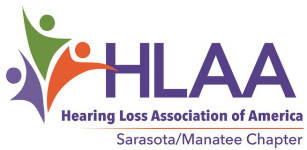Do you know that approximately 48 million Americans have some level of hearing loss? In Sarasota and Manatee counties, there 135,000 people with hearing loss. That is 1 in 5 people. 14% seek treatment. Less than O.1% get support.
Most people wait 5 – 7 years before getting help for hearing loss. Family and friends often notice hearing loss before the person with hearing loss does.
Signs of hearing loss
* television is too loud
* requests many repeats
* not hearing the door bell and telephone
* fading away from conversation
* ‘jumps’ when you appear
Reasons for not getting help with hearing loss
*Denial – person with hearing loss will accuse people of mumbling
*Vanity – does not want to wear a hearing aid in case it makes him/her look old or feeble
*Cost – concerned about the cost of hearing aids.
*Stigma – stigma attached to hearing loss
Hearing Loss and Brain Size
Dr. Frank Lin and researchers from Johns Hopkins University, along with the Agency for the Aged, found that as we age, our brains shrink, and that the brains of people with hearing loss shrink more than those of people with normal hearing.
Untreated hearing loss can increase the risk of dementia, falls, hospitalization, diminished physical and mental health overall. The sooner hearing loss is treated, the less risk of brain deafness and dementia.
Seek Treatment
Go to your regular doctor and get a hearing test. If there is a problem, the doctor will refer you to an audiologist or hearing aid dispenser. You will find out what kind of hearing loss you have and how you may be helped
Conductive hearing loss can usually be fixed by removal of built-up wax, a foreign body (such as a bug, candy paper in the ear). Audiologists can always tell if you have been using q tips, as the wax is pushed down the ear canal, becomes compressed and painful. The audiologists like to say, ‘don’t put anything in your ear smaller than your elbow’.
Sensorineural hearing loss (nerve deafness) is usually permanent and cannot be cured, but can often be helped with hearing aids, cochlear implants and assistive listening devices.
Hearing Aids
We all want to wear the cute little in-the-ear hearing aids. However, the bigger the hearing loss, the bigger the hearing aid
Cochlear Implants
If you get to the point where you lose your hearing and hearing aids do not help any more, it may be time to check into a cochlear implant. A cochlear implant is a small electronic device which can help provide a sense of sound to a person who is profoundly deaf.
Programming
Hearing aids and cochlear implants are not like glasses. You don’t put them on and experience ‘20/20’ hearing. Hearing aids need patience, practice and programming. You need the patience to go back to the provider for programming until you get the sound and clarity that you can live with.
Communication Strategies for the person with hearing loss
Try not to bluff.
Hearing loss is invisible. Tell people how they may best communicate with you.
Sit with your back to the light, so you can see their face.
Choose a quiet table in a restaurant – away from the kitchen
Go to a restaurant at non-busy times
Communication Strategies for the hearing person when communicating with a person with hearing loss
Get the his/her attention
Face him/her
Remove objects from your mouth (gum)
Try not to put hands over mouth
Speak slowly and clearly. Shouting does not help.
Speak directly to the person – not to an intermediary
Auditory Training
Train the brain to hear sounds it has not heard in a long time.
Training exercises can be found online.
LACE – Language and Communication Enhancement
Read My Quips
Assistive Listening Devices
Captioned and Amplified Phones (free for Florida residents)
Bed Shaker Alarm Clock
Strobe light fire alarms
Flashing door bell ringers
Hearing Aid/Cochlear Implant dryer
Captioned Glasses at Regal movie theaters
Hearing Loop Systems
Hearing Loss Support Group
Hearing Loss Association of America, where you will find support, education and advocacy. You will meet others with hearing loss, be able to share stories and help each other out by sharing information.
Helen Keller(blind and deaf author and political activist) said,
‘Blindness takes you away from things. Deafness takes you away from people’.
In this age of technology, people with hearing problems can choose to stay connected to people; to remain in this world of communication, not out of it.
Sources:
Hlaa.org
You need not face hearing loss alone. Contact the local chapter of Hearing Loss Association of America (HLAA), where you will find support, education and advocacy. For more information, contact
[email protected] or call 941-320-8825
Anne Taylor is a bilateral cochlear implant user, a Gallaudet Certified Peer Mentor for the Hard of Hearing, Vice President of Hearing Loss Association of America (HLAA)/Sarasota, board member of HLAA/Sarasota and of HLAA/FLA.

